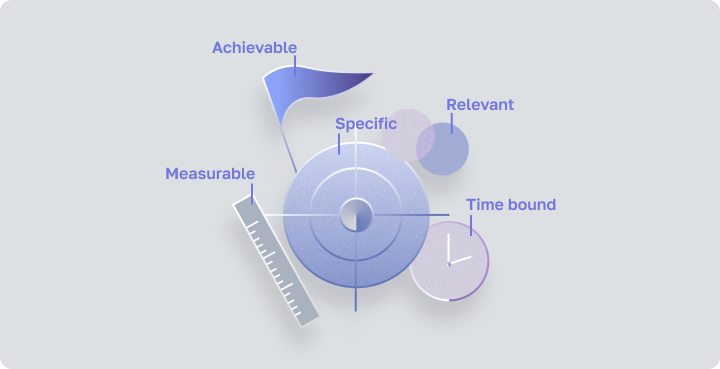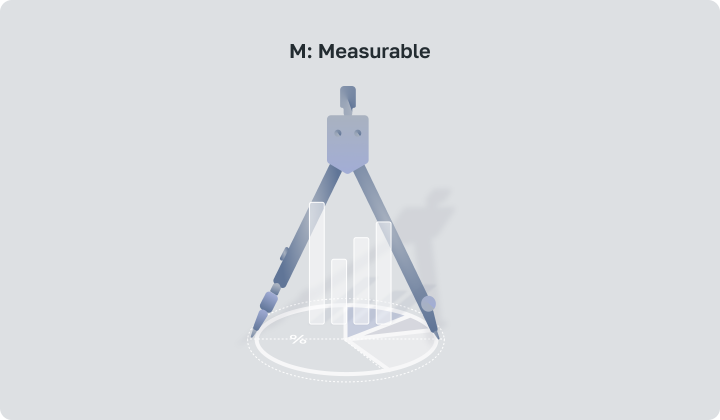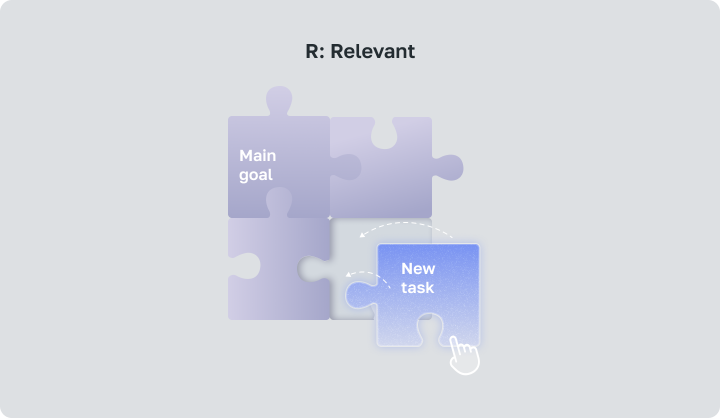Quick Overview
SMART goals are a framework for setting objectives that are Specific, Measurable, Achievable, Relevant, and Time-bound.
Specific tasks are clear and well-defined, measurable are quantifiable, achievable targets are realistic and attainable, relevant align with broader objectives, and time-bound objectives have a deadline. By adhering to the SMART criteria, individuals and organizations can create actionable plans, track progress effectively, stay motivated, and achieve success.
This approach ensures that intentions are not just vague aspirations but concrete targets with a clear roadmap for accomplishment. Whether in personal development, business, or project management, SMART methodology provide a structured framework for setting and achieving objectives efficiently.
 What are SMART goals?
What are SMART goals?
SMART goals are a method for setting objectives. SMART goal meaning is the acronym describes what is a smart goal and serves as a guide to ensure objectives are clear, actionable, and attainable.

- Specific goals clearly state what needs to be accomplished.
- Measurable goals establish criteria for evaluating progress.
- Achievable goals are realistic and within reach, ensuring motivation and feasibility.
- Relevant goals fit with bigger plans and help to achieve overall success.
- Time-bound objectives have a defined timeframe for completion, enhancing accountability and urgency.
By adhering to the SMART objectives, individuals and organizations can set objectives that are well-defined, trackable, and ultimately more likely to be accomplished. This structured approach to smart goal setting fosters clarity, motivation, and success in various domains, from personal development to professional endeavors.
Step-by-Step Guide to Writing SMART Goals
Introducing a step-by-step guide to writing SMART goals. This resource will walk you through each component — Specific, Measurable, Achievable, Relevant, and Time-bound — ensuring your intentions are clear, achievable, and actionable. Get ready to set yourself up for success with this comprehensive smart goal guide.
 S: Specific
S: Specific
In the context of SMART goals, “specific” refers to clearly defining the objective without ambiguity. To ensure specificity, clearly articulate what you want to accomplish, including who is involved, what needs to be achieved, why it’s important, where it will take place, and which constraints or requirements exist. Avoid vague language and be precise in detailing the desired outcome.

For example, instead of stating a goal as “increase sales”, make it specific by saying “increase monthly sales revenue by 15 % within the next quarter”. This clarity ensures everyone involved understands the smart goal and can work towards achieving it effectively.
 M: Measurable
M: Measurable
On the background of SMART goals, “measurable” means establishing concrete criteria for assessing progress and success. To set a measurable smart goal, define specific metrics or indicators that can quantify your progress towards achieving the objective. Determine how you will measure success and track your advancement over time.

For example, if your goal is to improve customer satisfaction, you might measure it through survey responses, ratings, or feedback. Ensure these metrics are quantifiable, such as percentages, numbers, or monetary values, enabling you to gauge your progress objectively and adjust strategies as needed to meet your targets.
 A: Achievable
A: Achievable
When setting achievable targets within the SMART framework, ensure they are both realistic and challenging. Assess your resources, capabilities, and constraints to determine if the smart goal is feasible. Aim for a balance between ambition and attainability, considering your skills, time, and available resources.

Break larger tasks into smaller, manageable tasks to maintain momentum and prevent overwhelm. Set benchmarks to track progress and make adjustments as necessary. By setting smart goals that stretch your abilities while remaining within reach, you can maintain motivation and steadily progress towards success.
 R: Relevant
R: Relevant
In the context of SMART goals, “relevant” signifies ensuring that your ideas align with broader objectives and contribute meaningfully to your overall mission or purpose. To set relevant, SMART goals, consider how they fit into the bigger picture of your personal or organizational aspirations. Align tasks with strategic priorities, values, and long-term plans.

Assess whether achieving the SMART goal will have a significant impact on your objectives, and whether it addresses current challenges or opportunities. By ensuring relevance, you can focus your efforts and resources effectively, driving progress towards your overarching vision.
 T: Time-bound
T: Time-bound
Setting time-bound objectives within the SMART framework is crucial for providing a sense of urgency and accountability. Clear deadlines create a sense of structure and momentum, preventing procrastination and ensuring timely progress.
By establishing specific timeframes for SMART goal attainment, you set a clear expectation for when results should be achieved, allowing for effective planning and prioritization of tasks.

Additionally, deadlines provide a means of measuring progress and evaluating performance. Whether short-term or long-term, time-bound SMART goals help maintain focus, motivation, and momentum, ultimately increasing the likelihood of success.
Additional Insights and Tips on SMART Goals
For effective use of the SMART goals’ system, please consider these additional insights and tips:
- Prioritize clarity: Ensure that your ideas are clear and concise, avoiding ambiguity or vagueness in their formulation.
- Break it down: Break larger goals into smaller, manageable tasks or milestones. This makes them less daunting and easier to tackle, leading to a greater sense of accomplishment.
- Stay adaptable: While setting SMART goals is important, remain flexible to adapt them as circumstances change. This agility allows you to respond to new opportunities or challenges effectively.
- Monitor progress: Regularly track your progress towards your ambitions. This helps you stay accountable and make any necessary adjustments to ensure success.
- Stay motivated: Maintain your motivation by celebrating achievements, no matter how small. Recognizing progress boosts morale and keeps you motivated to continue working towards your objectives.
- Seek feedback: Don’t hesitate to seek feedback from others, whether it’s peers, mentors, or supervisors. Their insights can provide valuable perspectives and help refine your goals for better outcomes.
- Reflect and learn: Take time to reflect on your goal-setting process and outcomes. Identify what worked well and what didn’t, and use these insights to refine your approach in the future.
By incorporating these insights and tips into your SMART system, you can maximize your effectiveness and achieve greater success in your endeavors.
 The Impact of Context Switching on Goal Achievement
The Impact of Context Switching on Goal Achievement
Context switching, or frequent shifts between tasks, can hinder the achievement of SMART goals by disrupting focus, decreasing productivity, and increasing errors.
It fragments attention, leading to decreased efficiency and effectiveness in SMART goal pursuit. Maintaining focus on one task at a time can enhance concentration and goal attainment.
 The Role of Short-term Goals in Achieving Long-term Objectives
The Role of Short-term Goals in Achieving Long-term Objectives
Setting short-term, measurable SMART goals contributes to long-term success by providing clear milestones, maintaining motivation, and enabling timely course corrections. Achieving these smaller objectives incrementally moves progress forward, reinforcing confidence and commitment to the larger, overarching ambitions.
This iterative approach fosters steady progress and enhances the likelihood of long-term objective attainment.
 Crafting the Perfect 90-Day Plan
Crafting the Perfect 90-Day Plan
A 90-day plan, employing the SMART system, is utilized for short-term goal setting and strategic planning. It outlines specific objectives to be achieved within a three-month period, providing a clear roadmap for progress.
These plans are commonly used at the beginning of a new quarter or project cycle to set achievable targets and measure success. They foster focus, accountability, and momentum, driving progress towards larger, long-term objectives.
Crafting a 90-day plan with the SMART goals system involves:

- Define Specific objectives for the next three months.
- Make Measurable milestones to track progress.
- Ensure objectives are Achievable within the timeframe.
- Align objectives with Relevant priorities and strategic plans.
- Set Time-bound deadlines for each milestone.
- Break down tasks into actionable steps.
Regularly review and adjust the SMART goals plan as needed to stay on track and achieve success within the 90-day timeframe.
Conclusion
In conclusion, understanding how to write SMART goals is essential for effective goal setting and achievement. By following this framework, ideas become Specific, Measurable, Achievable, Relevant, and Time-bound — became really SMART goals. This approach ensures clarity, accountability, and motivation throughout the goal-setting process.
Remember to articulate clear objectives, establish measurable criteria, assess feasibility, align SMART goals with broader priorities, and set realistic deadlines. Embrace the iterative nature of goal setting, allowing for adjustments and refinements along the way.
With determination and focus, SMART goals provide a roadmap for success, guiding you towards your desired outcomes. So, whether it’s personal growth, professional development, or organizational success, apply the SMART criteria to your goal-setting endeavors and watch as your aspirations transform into reality. Keep aiming high, stay committed, and celebrate your achievements along the journey!
